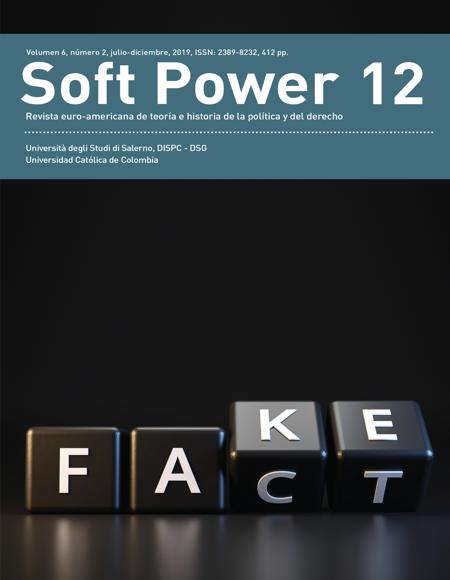Resumo
This essay is aimed at thematising the topic of post-truth in the ‘post-democratic’ constellation. From this perspective, it firstly illustrates contents and features of the broad concept of post-democracy, therefore analysing both the issue of the crisis of democracy and the impact of contemporary neoliberal platform capitalism on these process. Hence, it addresses the related topics of new technologies and changes in political communication, along with the unfolding of the neo-populist phenomenology. A number of concluding meta-theoretical reflections on the relationship between democracy, knowledge and political representation are also developed.

Referências
Agamben, G. (2010). In che stato è la democrazia? Roma: Nottetempo.
Anselmi, M. (2017). Populismo. Teorie e problemi. Milano: Mondadori.
Bernini, L. (2008), Le pecore e il pastore, Napoli: Liguori Editori.
Bobbio, N. (1995). Il futuro della democrazia. Torino: Einaudi.
Canovan, M. (1999). Trust the People! Populism and the Two Faces of Democracy, in “Political Studies”, pp, 2-16.
Canovan, M. (1981). Populism, Hartcourt Brace Janovich, New York-London: Routledge, pp. 172-225.
Crouch, C. (2019). Post-democracy and Populism, in “The Political Quarterly”, 124-137.
D’Ancona, M. (2017). Post-truth: the new war on truth and now to fight back. London: Ebury Press.
Della Porta, D. (2015). Social Movements in Times of Austerity: Bringing Capitalism Back Into Protest Analysis. London-New York: Routledge.
Demata, M. (2016). Ideological and language polarization in online political discourse. The White House Facebook page, Lingue e Linguaggi, vol. 17 (2016), pp. 83-100.
Diamanti, I. & Lazar, M. (2018), Popolocrazia. Roma-Bari: Laterza.
Engesser, S., Ernst, N., Esser F., Büchel, F. (2017). Populism and social media: how politicians spread a fragmented ideology, in “Information, Communication & Society”, (20)8, 1109-1126, DOI: 10.1080/1369118X.2016.12.
Ferrara, A. (2015), La fine del postmoderno nell’orizzonte post-moderno, University of Perugia.
Ferraris, M. (2017). Postverità ed altri enigmi. Bologna: Il Mulino.
Foucault, M. (2004a). Sécurité, territoire, population. Course au Collège de France 1977-1978, Seuil: Gallimard.
Foucault M. (2005b), Naissance de la Biopolitique. Course au Collège de France 1978-1979, Seuil: Gallimard.
Fumagalli, A. (2011). Bioeconomia e capitalismo cognitivo. Roma: Carocci.
Fumagalli, A. (2018). Per una teoria del valore-rete, in D. Gambetta (a cura di,), Datacrazia, Roma: D. Editore.
Griziotti, G. (2018). Big emotional data, in D. Gambetta (eds.), Datacrazia, Roma: D. Editore.
Goodwin, J., Jasper, J. M., Polletta, F. (eds) (2001), Passionate Politics. Chicago: The University of Chicago Press.
Habermas, J. (1973). Legitimationsprobleme im Spätkapitalismus, Frankfurt a.M.: Suhrkamp Verlag
Habermas, J. (1992). Faktizität und Geltung. Beiträge zur Diskurstheorie des Rechts und des demokratischen Rechtsstaates, Frankfurt a.M.: Suhrkamp Verlag
Han, B.C. (2016). Psicopolitica.Roma: Nottetempo.
Inglehart, J. Norris P. (2017). Trump, Brexit and the Rise of Populism: Economic have-not and Cultural Backlasch, Harvard: in Faculty Research Working Paper Series, p. 452.
Lo Schiavo, L. (2014). Ontologia critica del presente globale. Milano-Udine: Mimesis.
Lorusso A. (2018), Postverità, Fra reality tv, social ai media e storytelling. Il Mulino: Bologna.
Mastropaolo, A. (2011). La democrazia è una causa persa? Paradossi di un’invenzione imperfetta. Torino: Bollati Boringhieri.
Mazzoleni, G. & Bracciale, R. (2018). Socially mediated populism: the communicative strategies of political leaders on Facebook, Palgrave communications.
Moffit B. (2016), The global rise of populism, performance, political style, and representation. Standford: University Press.
Moffit, B. & Tormey, S. (2014). Rethinking Populism: Politics, Mediatisation and Political Style, in “Political Studies,” vol. 62, pp. 381-397.
Moini, G. (2016). Neoliberalism as the ‘connective tissue’ of contemporary capitalism, “Paco Journal”, Issue 9(2), pp. 278-307.
Mouffe, C. (2005). On the Political. London-New York: Routledge.
Mudde (2004), The Populist Zeitgeist, in “Government and Opposition”, Vol. 39 (4).
Palano, D. (2012). La democrazia e il nemico. Milano-Udine: Mimesis.
Palano, D. (2016). In nome del popolo sovrano? La questione populista nelle postdemocrazie contemporanee, in S. Cingari, A. Simoncini (eds.), Lessico postdemocratico, Perugia: Università per stranieri University Press.
Pellizzoni, L. (eds) (2005). La deliberazione pubblica, Roma: Maltemi.
Pinto, V. (2013). Trasparenza, in Zappino F., Coccoli L, Tabacchini M. (eds.), Genealogie del presente. Lessico politico per tempi interessanti. Milano-Udine: Mimesis, pp. 231-247.
Revelli, M (2017). Populismo 2.0. Torino: Einaudi.
Sorrentino, V. (2008), Il pensiero politico di Foucault, Meltemi, Roma.
Stanley, B. (2008). The Thin Ideology of Populism, in “Journal of Political Ideologies”, Vol. 13, Issue 1, pp. 95-110.
Sustein, C. (2017). La democrazia nell’epoca dei social media. Bologna: Il Mulino.
Urbinati, N. (2013). La mutazione antiegualitaria. Roma-Bari: Laterza.
Urbinati, N. (2014). Democracy disfigured. Opinion, Truth and the People. Harvard: University Press.
Waisbord, S. (2018). The elective affinity between post-truth communication and populist politics, in “Communication Research and Practice”, pp. 1-18.
Zolo, D. (1992), Il principato democratico. Per una teoria realistica della democrazia. Milano: Feltrinelli.











